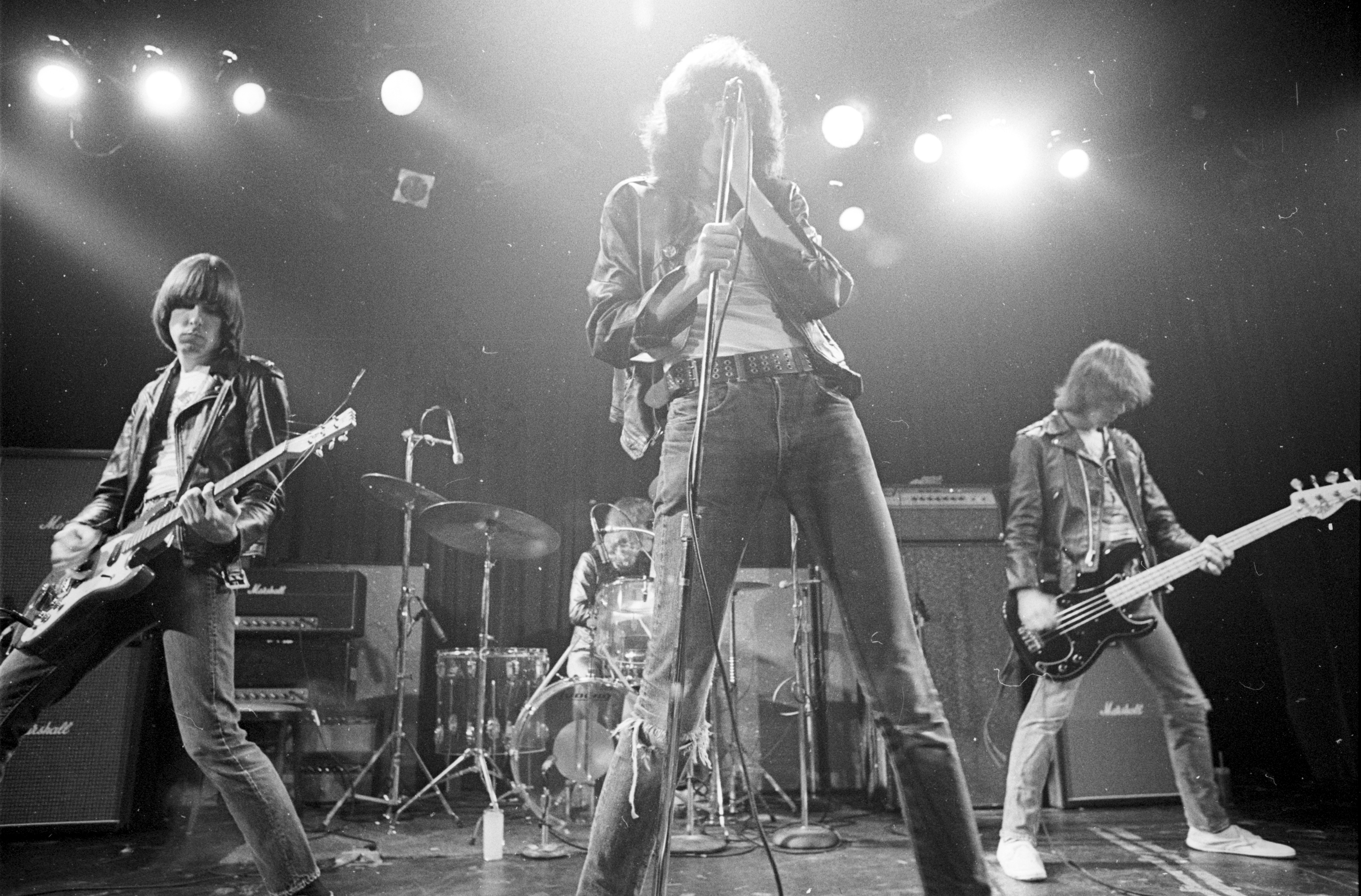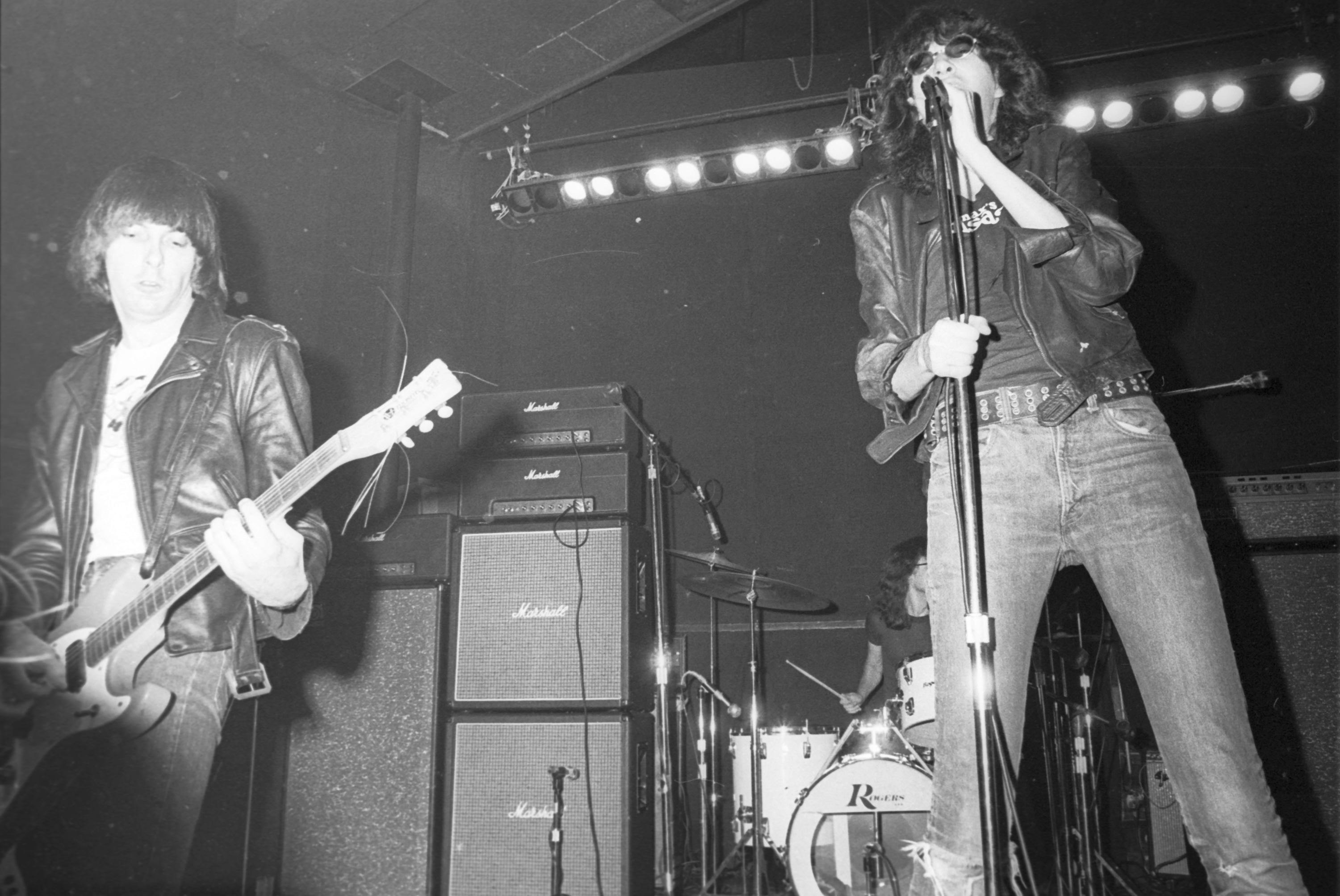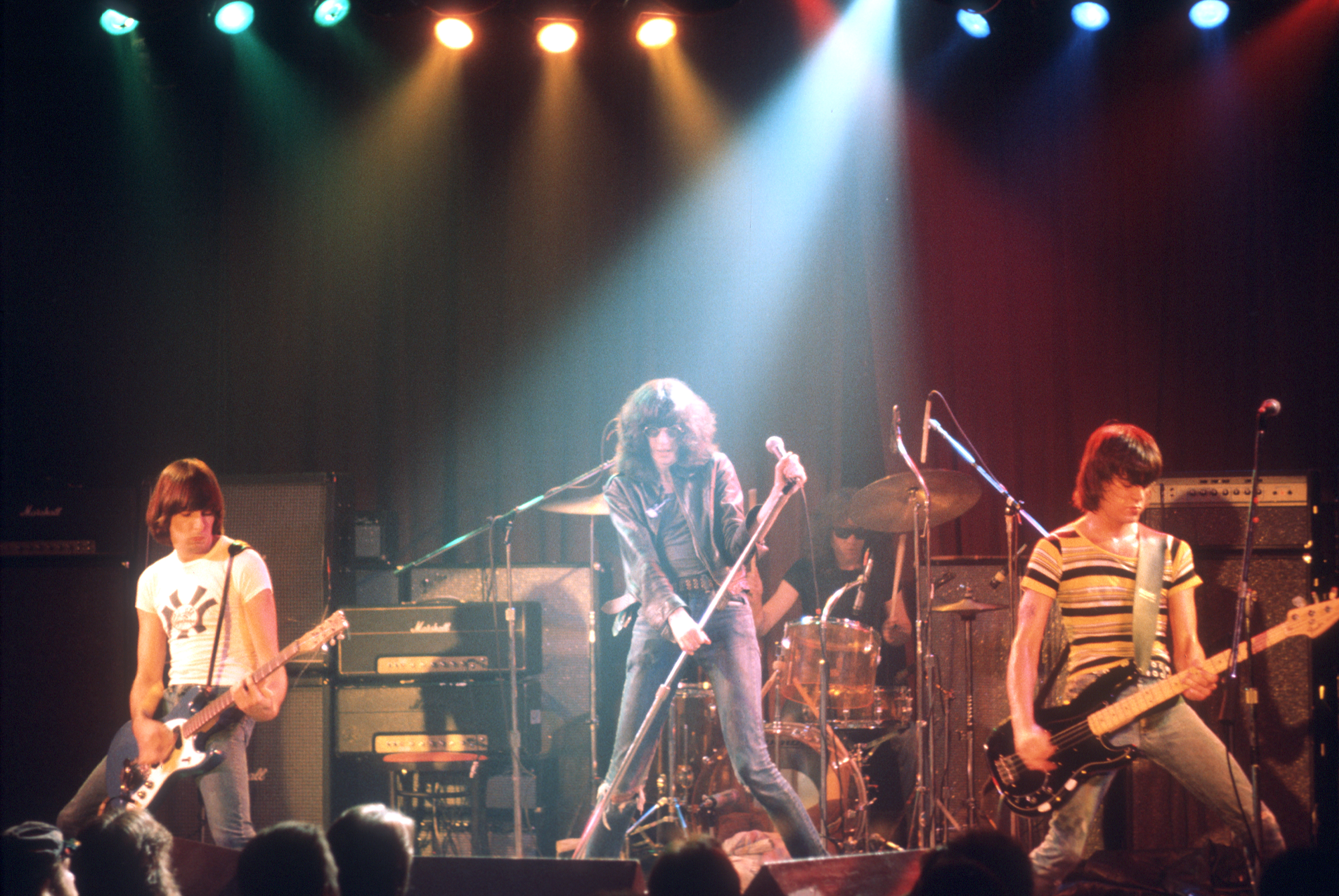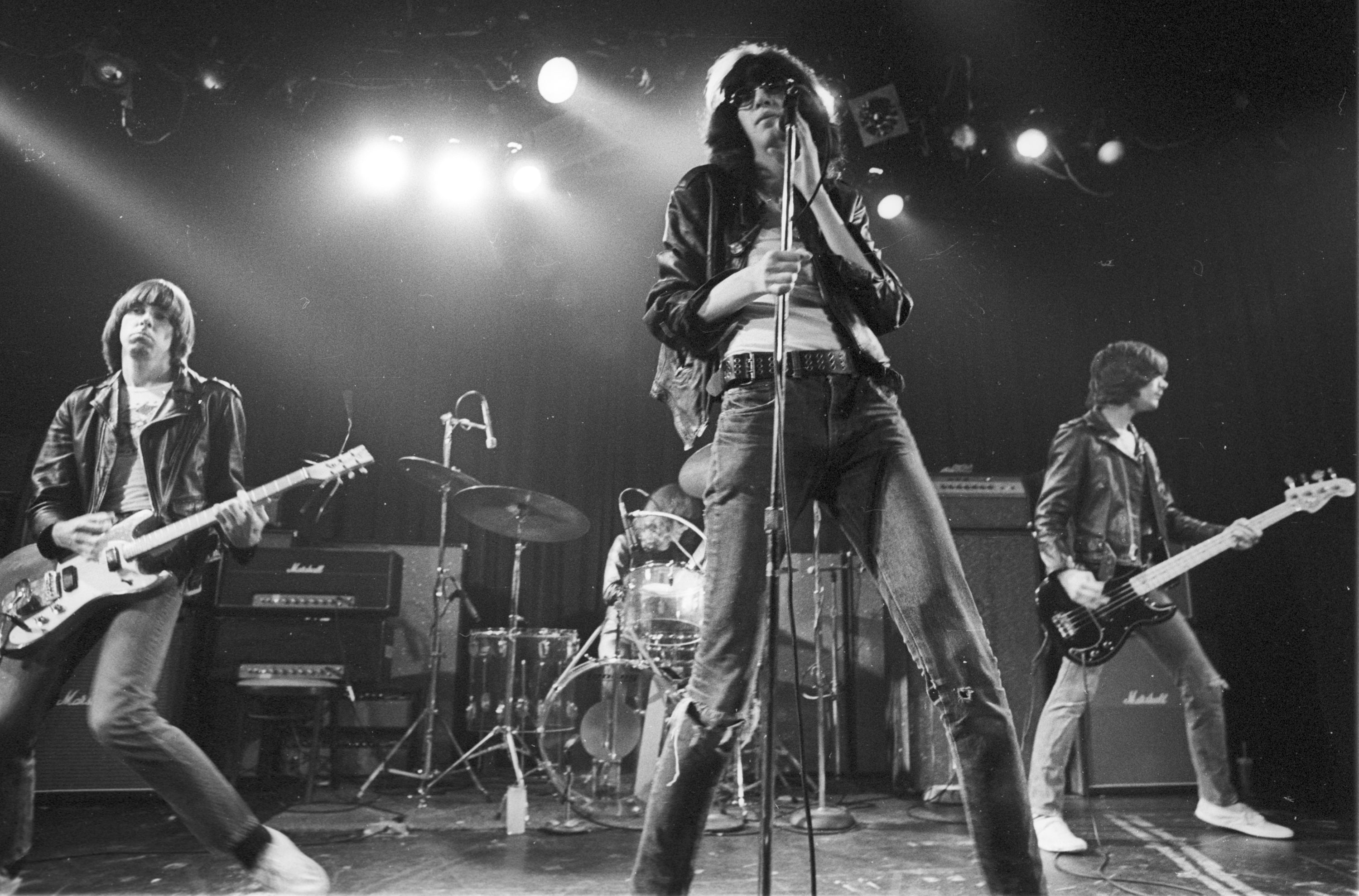This article originally appeared in the August 1986 issue of SPIN.
It was one of those humid summer days in 1979 when the air on the Bowery was filled with the foul odor of week-old garbage. A horribly muggy day that promised to kill off everyone in New York City. The Ramones were happy to be getting out of town and found refuge in their air-conditioned van as they prepared for a two-and-a-half hour drive to Baltimore. They hadn’t even driven the several blocks through the Bowery into Chinatown before trouble started.
“John, you better take back what you said about my girlfriend!” Dee Dee Ramone stammered from the back of the van, where he was sitting next to a platinum blond. Johnny ignored him. Up front, Joey Ramone, in the passenger seat, rifled through a box of tapes looking for the right morning music. Way in the back, Marky Ramone slept off a hangover. A couple of girlfriends and a journalist filled the extra seats. Everyone acted as if Dee Dee wasn’t even there.
“JOHN, YOU’D BETTER TAKE BACK WHAT YOU SAID ABOUT MY GIRLFRIEND…,” Dee Dee continued screaming.
“What?” Johnny sneered. “That she’s a slut?”
“I’M GONNA KILL YOU! I’M GONNA KILL YOU!” Dee Dee was going hoarse from screaming and the veins on his neck looked like they were about to explode.
“No, you’re not,” Johnny laughed calmly. The rest of the Ramones ignored the outburst as their girlfriends busied themselves with their nails. Johnny refused to give an inch. Finally, Dee Dee couldn’t take it anymore. He jumped out of the van at a stoplight, and, like the grunt on the chopper in Apocalypse Now, screamed, “I’M NOT GOIN’!”
Monte Melnick, the Ramones’ driver and tour manager, took Dee Dee aside and after listening to him rant and rave for half an hour, calmly talked him into getting back in the van. A journalist along for the mini-tour decided to make a hasty retreat, on foot, back to the Bowery.
“What’s the matter,” Joey laughed. “Can’t you take the pressure?”
After 12 years without a hit record, without record company support, without radio or video airplay, and with only their records and live performances, their grinding chainsaw beat, and the kick-ass shows that remind one of an aircraft carrier while a squadron of jet fighters lift off for a bombing run, one blaring rocker after another—the band that reinvented rock ‘n’ roll has withstood the pressure.
What did you think of the Ramones’ show the other night?
Norman Mailer: “For me it was like I was an old car and I was being taken out for a ride at 100 miles an hour, and I kind of like it because I was really getting rid of a lot of rust. I don’t know if I’d like it night after night, and I’m not sure it isn’t absolutely killing. You’ve got to be super-human to pay that stuff night after night and not have your senses wiped out by it.”
“Nobody’s gonna like you guys, but I’ll have you back.”
—Hilly Kristal, owner of CBGB’s, to the Ramones after their first audition.

“Hey, hey, what’s going on?” Joey greets you at the door. You know he’s been on the phone for an hour. “Could you, like, hang on for a minute?” he asks sheepishly. He’s always embarrassed that he can’t give you his full attention, but his life’s one constant interruption after another.
The phone doesn’t even ring, the receiver just keeps clicking with Joey saying, “Can you hold on for a second?” while he jockeys calls. On the floor is a tangle of extension cords, strips of outlets, tape recorders, portable keyboards, video cassettes, tape cassettes, and clothes from his last tour. On the kitchen table where Joey sits talking on the phone are piles of fan mail and empty take-out cartons. On the walls hang original Hard Day’s Night and some obscure Mick Jagger Western film posters, and on the couch lie boxes of the new album, Animal Boy, and the English EP, “Something to Believe In.”
Joey hasn’t had time to listen to the new LP more than a couple of times, but everyone in the room is going crazy over it, though they don’t want to seem overenthusiastic. “It’s good, isn’t it?” Joey laughs, finally getting off the phone. Everyone smiles and shakes their heads. The Ramones have done it again. The pressure’s off now.
It all started in a back room of a paint store, with Joey on drums, Johnny on lead, Dee Dee on bass and lead vocals, and another guy, who got kicked out after the first few rehearsals. Tommy Erdelyi, later Tommy Ramone, the first drummer and ad hoc adviser/manager, thought they would be an instant smash on the downtown artsy-fartsy music scene. The New York rock scene was in its death throes, but Lou Reed‘s Berlin, Wayne County‘s glitter-camp, and the New York Dolls‘ vulgar charm kept the underground alive and the critics wanting more.
The band was inspired by the bubblegum groups of the ’60s (such as the 1910 Fruitgum Company and the Ohio Express), early Beatles and Stones hits, later Gary Glitter, T. Rex, Slade, and the Stooges. The Ramones were basically a bubblegum group with a buzzsaw sound and sicko lyrics.
“I don’t wanna see your face
I don’t wanna see it please
You come knockin’ on my door
Gonna knock you on the floor”
Early gigs lasted only 15 minutes. Critics called it minimalism. Actually, the Ramones didn’t know enough songs to do 30-minute sets. They kept churning out songs, but it didn’t help because the songs only lasted a minute or two. Their first songs were inspired by a deep hatred of the mundane suburban existence it looked like they were doomed to.
Dee Dee was a crazed drug addict from Berlin who worshiped pop imagery while living the life of a criminal. Johnny was a juvenile delinquent who was disciplined at a military academy and liked to maintain an image of politeness, decorum, and structure while planning how to take over the world. Johnny and Dee Dee would hang out on the rooftops of Forest Hills, Queens, snorting Carbona and wondering where the fuck they fit into the picture. Before long the Carbona was replaced by jugs of wine, except for Dee Dee, who became a junkie.
What Johnny, Joey, and Dee Dee found in each other was the same sick sense of humor. That and the fact that rock ‘n’ roll seemed to be dying in front of their eyes. Together they wished for great rock ‘n’ roll to show them the way. Instead, they found that their twisted, humble beginnings, warped sense of humor, and dedication to mastering their musical instruments was their only way out.
“Glad to See You Go” typified the atmosphere of the times. The song was about Dee Dee’s then-girlfriend, Connie Ramone, as she was known. To put it bluntly, Connie, God rest her soul, was, uh, difficult. Until her death a few years ago from drug overdoes, she was a notorious celeb on the punk circuit. While she was going out with New York Doll Arthur Kane, she cut off his little finger with a knife. While she went with Dee Dee, she once sliced up his buttocks with a beer bottle (he couldn’t sit down until the stitches were removed).
Dee Dee and Connie reigned as the king and queen of the scene. They could often be seen at CBGB’s, Dee Dee usually out of it, threatening to kill people with a large club he carried. “What makes Dee Dee so distinctive?” then-manager Danny Fields was asked in a 1980 Esquire article. His IQ…His abiding sense of decency, justice, honor, integrity, morality…He’ll also sleep with anything, which makes him very hot.'”
Everyone in and around the Ramones hated Connie. Dee Dee freely admits that if he hadn’t broken up with Connie he’d be dead today.
“Dee and I came up with the song ‘Glad to See You Go,’ about Connie’s leaving,” Joey recalled.
“Gonna take a chance on her
One bullet in the cylinder
And in a moment of passion
Get the glory like Charles Manson
Ya gotta go go go goodbye
Glad to see you go go go go goodbye”
The curse of Connie would come back to haunt the Ramones years later, when the song was released on their second album, Leave Home. The program director at a rock station in NYC heard the reference to Charles Manson, thought the Ramones were glorifying mass murder, and refused to touch the LP with a 10-foot stylus.
The Ramones couldn’t understand why anyone would be offended by songs like “Blitzkrieg Bop,” “Beat on the Brat,” and “Today Your Love, Tomorrow the World.” They became irritated when asked about their Nazi imagery. “We’re right-wingers, but we have nothing to do with the German ideology at all,” Tommy said in 1976, “other than romanticism of the military.”
In retrospect, it’s easy to understand why the Ramones used military references and metaphors in their songs. They were at war with the world. Disco music was the rage and the band had committed themselves to making rock ‘n’ roll kick ass again.
Getting signed was a miracle in itself. No record company in its right mind would sign a New York rock ‘n’ roll band. The New York Dolls’ spectacular commercial failure left a black cloud over New York groups. No one thought the Ramones would make it. When Blue Sky records auditioned them as the opening act of a Johnny Winter concert in Connecticut, they were pelted with bottles and booed off the stage.
“They’re great,” Clive Davis was heard to say, “but you’ll never get them on wax.” Even Seymour Stein, who took the plunge with them and other punk groups on his Sire label, said to independent producer and Red Star owner Mary That that the didn’t think the Ramones could be recorded.

Joey’s long, gangly body stands hunched over the jukebox in Paul’s Lounge in New York’s East Village. He’s reading the selections like a Wall Street analyst studies the Dow Jones. His table is filled with friends. “So what do you want to do tonight?” someone asks over the plates of half-eaten cheeseburgers, shrimp scampi, raw oysters, and crabmeat in avocado. “Pig Vomit’s playing the Ritz,” someone answers. “King Flux is playing the Cat Club.” Both are within walking distance and provide better rock ‘n’ roll than the trendier clubs. Joey prefers listening to good music to hanging out being trendy.
The conversation at the table turns to reminiscences of fucking to Ramones music as “Danny Says” builds on the jukebox and the beer flows freely. Everyone offers a story, and finally Joey is persuaded to tell one. “Yeah, I went home with this real nut once. She was nice, ya know, but she was still a nut, and she wanted to listen to us while we were in bed.”
“What did she want you to play?” the whole table choruses.
Joey explodes with laughter just thinking about it: “‘I Wanna Be Sedated’.”
Maybe everything just clicked (or as Joey put it when asked how they came up with their own sound: “It’s just the chemistry of the four of us—a chemical imbalance”), but when the Ramones walked into Plaza Sound recording studios in the bowels of Radio City Music Hall to record their first album and walked out a week later, history had been made. The album cost $6,400. The record companies sat up and took notice. What they noticed scared the hell out of them. The music was faster, louder, and scarier than anything before—just when rock ‘n’ roll was getting safe.
By the time the second album rolled around, the Ramones were beginning to realize the long road ahead of them. “‘Swallow My Pride’ was about signing with Sire,” says Joey. “It was about how the first album didn’t skyrocket. There were a lot of things that were fucked up in those days. Sire was then distributed by ABC. They really sucked. We’d fly to some city where we were gonna play and there’d be no one there to meet us at the airport. So you swallow your pride.”
America wasn’t ready for a band with songs like “Texas Chain Saw Massacre” and “All That Girl,” but in England they caused a musical revolution. “But we were always concerned about good taste,” Johnny claims. “There were certain songs that we’d say, ‘That’s not in good taste, let’s not do that.’ Dee Dee once had a song called ‘Cripple.’ We said, ‘Let’s leave that one for the future, if we put out a totally offensive album.’ But you can write about pinheads. They’re not gonna get together and organize any kind of picket line…”
Even though there were problems with the second album, Leave Home, the punk scene was exploding. Famous rock stars started dropping by CGBG’s to see what all the noise was about. “I remember Lou Reed telling Johnny that he wasn’t playing the right guitar,” Joey said “and that he should play a different type of guitar. That didn’t go over too well with John. When John found his guitar, he didn’t have much money. He bought his guitar for like 50 bucks ’cause that’s all he had. And he like the idea of using a Mosrite because no one else had one and he thought it would, like, become his trademark. So John thought Lou Reed was a real jerk.”
The Ramones’ luck began to change when they recorded Rocket to Russia, their third LP. On January 7, 1978, they played a sold-out show at New York’s Palladium, kicking off a national tour. They had finally outgrown the Bowery. The New York Times reviewed them under the headline: “Ramones in the Big Time.” It looked like they had finally made it.
“It was sorta like the beginning of something supposedly great. We got some heavy promotion—the stand-up cardboard cutouts—and we got buttons and stuff. We were the first band to have baseball bats for ‘Beat on the Brat,’ and switchblades for Leave Home,” says Joey with pride.
“I remember,” says Joey, “writers being afraid to interview us because they were afraid that we’d kick the shit out of them. A lot of radio stations thought that, too, which didn’t make any sense.”
But promotional problems were the least of their worries. Just as the Ramones were kicking off their Rocket to Russia tour, the Sex Pistols flew into Atlanta and turned their first and last American tour into a media circus that overshadowed the Ramones.
Punk’s time had come in America. The Ramones were selling out 2,500-seat auditoriums. But one night at the Capitol Theater in New Jersey, Joey, forever plagued with sinus problems, was inhaling a vaporizer from a tea kettle, to clear up his nose and throat before going onstage, when the kettle exploded in his face. It was the beginning of a series of accidents that would continually plague him.
With each injury, Johnny would go into a frustrated frenzy and accuse Joey of goldbricking. But it wasn’t until after the filming of their movie, Rock ‘n’ Roll High School, the Phil Spector sessions in hell for the End of the Century album that Johnny and Joey really started to hate one another.

“He always carried three guns around with him,” says Johnny of Phil Spector. “He was going shoot us. He started a fight, you know, for publicity, a publicity stunt. He drove me to beating him up. He wanted to be punished, you know? I didn’t want to. We were prisoners in his house for about six hours, and we thought we were gonna get shot. I said, ‘Let’s go,’ and he pulled out a gun and said, ‘Do you wanna leave?’ I said, ‘No, that’s OK, we’ll stay for awhile.'”
Joey’s side of the story about working with Spector is equally bizarre. “Phil would make us run through the song a thousand times before he’d even do one take. And then he’d get drunk. The son of the guy who owned Gold Star recording studios [the home of Spector’s ‘Wall of Sound’ in L.A.] would bring Phil these tiny little Dixie cups of Manischevitz wine and before long Phil would be drunk out of his mind.”
“He’d be stompin’ on the floor, cursin’. ‘Piss, Shit, Fuck! Piss, Shit, Fuck! Fuck this shit!’ and that would be the end of the session. Really, nothin’ much would get done, and then Johnny and Dee Dee didn’t want to work with him no more. I really wanted to. We called a meeting and told him if he didn’t stop drinking we wouldn’t be able to work with him. After that he was better, but he was still…the guy’s a perfectionist. He just couldn’t finish things.”
Seymour Stein, president of Sire, who had just sold his label to Warner Brothers for big bucks and a seat on the board of directors, was forced to sue Spector to get back the Ramones’ master tapes to have something to release.
“But I think Spector did a great job,” says Joey. “But the guy is definitely nuts. I remember he’d have some hooker hanging out in the studio and he’d just insult her. She was paid for his abuse—it was crazy!”
The LP and movie finished, the band returned home to New York, Joey to a co-op on the Lower East Side, Dee Dee to his house in Queens, Johnny to his apartment on Fourth Avenue, and Marky to Brooklyn. For the first time in the Ramones’ careers, they were financially independent.
The Ramones have never, even from day one, ever operated in the red. When it comes to the 3 R’s, they may be “D-U-M-B, everyone’s accusing me,” as Joey sings, but they’re not stupid. Their only concern has been writing songs, reading the trades, and adding up concert receipts.
“They wanted to succeed,” says Linda Stein, Seymour’s ex-wife, who once managed the band. “They wanted to sell records and tickets and make money. So they became very demanding. You can’t ever be five minutes late, you can’t ever not come to rehearsal, you can’t ever make a mistake. I don’t care if the audience is howling for encores, if you made a mistake, when you get off that stage you’re being screamed at by the other Ramones. As long as your’e a Ramone, there’s no room to misbehave or get yourself screwed up. I mean, it’s like a Nazi army!”
It was Tommy who first set up the rules. He was more than just a drummer who happened to be spokesman for the group, he was the Boss. What Tommy said, everyone did. Interviews were tortuous affairs, during which Tommy would refuse to answer specific questions, trying to promote the Ramones Myth. All members of the band had to be present. No solo interviews were permitted. Johnny would join in, but Tommy ran the show: “No, none of the other Ramones had been in rock groups before. Yes, the Ramones are like brothers, everyone sitting around writing songs together. No, no one writes a song by themselves.”
It was a peculiar form of utopian communism that Tommy liked to project, especially from a self-professed right-wing group. One can only wonder if Dee Dee had been allowed to talk about chicken-hawking on 53rd and Third or packing a 9-mm. Walther P-38 automatic and Johnny throwing TV sets off rooftops, would the world have been confused about who really started punk—the English or the Americans.
When Tommy left the Ramones after Rocket to Russia‘s release (to be replaced by heavy metal drummer Marc Bell), the band lost its authority figure. Slowly all the rules began to change. Joey, Dee Dee, and Johnny chafed under the Ramones Myth and eventually began taking individual songwriting credits. They fired Danny Fields, their original manager, and Linda Stein, and then signed with Gary Kurfirst, who was managing Talking Heads. By the time the Spector album, End of the Century, was finally released in March 1980, Johnny and Joey had stopped speaking.
“There have been times when no one in the band has been speaking to each other,” says Danny Fields, “but they go out and play, and as a member of the audience you won’t know that and that is my definition of professionalism.”

The Ramones were smart enough to realize that if they didn’t leave the personal shit behind they’d never make it. After 13 years of heroin addiction, even Dee Dee realized that if was time to clean up. “I used to think I had to live the life of a punk rocker to be authentic, but I learned from watching Sid Vicious die. Drugs are dangerous.” In addition to his constant struggle to stay drug-free, Dee Dee acted as mediator between Johnny and Joey, and always found himself being asked to choose sides.
Johnny decided to take control of the band. He threatened to break up the group unless things were done his way. He hated the reaction to their album, Pleasant Dreams, and he despised the direction the band was moving in. “I mean,” he said, “there were albums where I became totally disinterested and didn’t write anything on it, like Pleasant Dreams. The Ramones were losing the respect we’d earned throughout the years. So then, I started to fight for things, demanding, ‘I’m not continuing anymore unless we do this or that.'”
One of the things he demanded was that Marc Bell (né Ramone) be replaced. Marc had a serious drug and alcohol problem, and his condition added to the tensions in a band in which no one was speaking to each other. Soon, Marky was thrown out.
Another thing Johnny demanded was a new approach to the Ramones’ music. That is, an OLD approach to the Ramones’ music.
One of the sore spots between Joey and Johnny is that Joey wants a hit, and Johnny doesn’t care. “All I wanna do,” Johnny said after the release of Subterranean Jungle, “is play the songs the kids wanna hear. Sometimes I don’t wanna be in the band anymore. Being with the same people and hearing the same conversations over and over—’Oh, this record’s gonna sell, we’re gonna have a hit and all that.’ I can’t listen to that stuff. I know what we should be doing. I don’t care whether it sells or not.”
That, says Johnny, was why the band took a new direction, starting with “Psychotherapy” from Subterranean Jungle, which he wrote with Dee Dee. “I wanted to do a hardcore song to show the hardcore people that we can play as fast or faster than they can. Nobody plays faster than us.”
Joey is as apathetic about hardcore as he is enthusiastic about the prospects of having a hit. “For the most part,” he says, “I just hear it [hardcore] all sounding the same. I really don’t hear anything that’s earth-shattering or that knocks me out.”
As much as hardcore has helped their career, it has also hurt it. As wonderful, amazing, and horrifying as slam-dancing is to watch, it takes a toll on people who practice it, and the groups who play the music for it. Monty, the Ramones’ road manager who always deals with whatever mess the group creates, says that the slam-dancing that goes on at Ramones concerts has made it difficult for them to get booked into clubs.
“I’ve had club owners just freak out. The security just goes crazy. They go right into the audience, grab these people and throw them out.”
“How do you explain what’s gonna be goin’ on? ‘Well, we’re gonna have a bunch of kids who will jump off the stage and land on their backs, and they’re also gonna be in the middle, slammin’ into each other…Some of these people are girls! They get hurt and they wanna stop the show. People get hurt! I don’t understand why they wanna do this. They wanna be part of the show, but why do it, so you can hurt people? And we get blamed for everything. It’s sick. You figure it out. I can’t. It’s getting worse, I’ll tell you.”
In 1985, just when things looked their bleakest, the Ramones’ luck began to change. They signed a new contract with Sire/Warner Bros. and with Tommy Erdelyi and Ed Stadium producing released Too Tough to Die, which revealed for the first time their political awareness.
“We had watched Reagan going to visit the SS cemetery on TV and were disgusted,” says Joey. “We’re all good Americans, but Reagan’s thing was like forgive and forget. How can you forget six million people being gassed and roasted?” he spits out, still indignant over Reagan’s betrayal.
The resulting single, “Bonzo Goes to Bitburg,” was a huge success with the critics and elevated the band that had once romanticized the military with songs like “Commando” to politically correct status.
“Joey is one of the first guys I called when I was putting together ‘Sun City’,” remembers Seven Van Zandt. “I thought ‘Bonzo’ was a great record. I’ve been a Ramones fan from the first album. I hate the idea of things being disposable like the English punk scene. The thing that is endearing about the Ramones is that they last.”
Finally getting respect and kudos from their peers, the band toured England in 1985 and played festivals throughout Europe, and suddenly Joey and Johnny started having fun together again. “Things are great when it’s just the band,” laughs Joey. “It’s the girls who cause all the shit. Girls are troublemakers.”
If the Ramones’ English tour in ’85 was a smash, their 1986 romp across the UK caused pandemonium. While Too Tough to Die was a return to good old punk rock with a few hardcore songs thrown in, the new album, Animal Boy, is a perfect blend of Johnny’s raw power, Dee Dee’s lunacy, and Joey’s pop sensibilities. It entered the English charts at 31.
It only takes 12 years of constant bullshit before you become an overnight sensation: 12 hard years of one-night stands and cranking out great albums that asshole DJs refuse to play because they’re not hip enough to get the joke; 12 years of traveling with your delinquent pals from Forest Hills to show the world how real rock ‘n’ roll is played; 12 years of playing music fast enough to rip through the sound barrier and not have your senses completely wiped out. When you’re a Ramone it takes the rest of the world 12 years to catch up with you.
“You know, people always talk about how good those CBGB’s days were,” says Joey. “Well, those days sucked. I’m a lot happier now. I mean, I like things now.” He starts to laugh when he thinks of the piles of dog shit that used to litter the floor of CBGB’s. “I mean, anything is better than that.”
“Sitting here in Queens
Eating refried beans
Reading all the magazines
Gulping down Thorazines
We ain’t got no friends
No Christmas cards to send
Our troubles never end
Daddy likes men
We’re a happy family
We’re a happy family
We’re a happy family
Me, mom, and daddy”
—”We’re a Happy Family”





